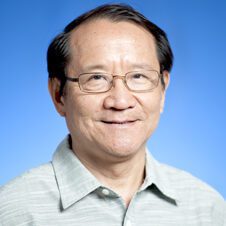Distinguished Scientist and Senior Program Director, Tumor Glycomics Laboratory, Biosciences Division
Denong Wang, Ph.D., has long-term research interest in the carbohydrate moieties that are critical for self/non-self-recognition and induction of antibody responses.
Wang and his team specialize in exploring the diversity of glycomes to identify potential new treatments for cancer and viral diseases. Wang’s laboratory was part of a National Cancer Institute network launched in 2008 to conduct glycomics research. The team has established multiple platforms of carbohydrate microarrays and introduced these glycomics tools to explore the structural and antigenic diversities of the glycome. The main research focus of his lab is on the immunogenic sugar moieties. In the past few years, his group has contributed to the identification of immunologically potent glycan markers of SARS-CoV, Bacillus anthracis exosporium, and several human cancers.
Wang received his Ph.D. in immunology and glycobiology with the late Professor Elvin A. Kabat at Columbia University in 1993. After that, he entered the developing field of post-genomics research. Before joining SRI in 2010, he served as head of the Functional Genomics Division at Columbia University’s Genome Center from 1998 to 2003 and was director of Stanford University’s Tumor Glycome Laboratory from 2007 to 2010.
Recent publications
-
Assessment of Immunologically Potent Carbohydrates
We present here our laboratory protocols for performing carbohydrate ELISA and discuss several assay platforms that may be applied complementarily to explore the carbohydrate moieties that are critical for host…
-
The “Janus-like” RNA-editing machinery in innate antiviral immunity
We discuss ideas and tools to identify the orphan drug candidates, including small molecules and biologics that may serve as effective modulators of the ADAR-1/IFN innate immunity and are thereby…
-
Targeting N-Glycan Cryptic Sugar Moieties for Broad-Spectrum Virus Neutralization: Progress in Identifying Conserved Molecular Targets in Viruses of Distinct Phylogenetic Origins
In this study, we characterized two broadly HIV-neutralizing agents, human monoclonal antibody 2G12 and Galanthus nivalis lectin (GNA), for their viral targeting activities.
-
Tenofovir Disoproxil Fumarate: Toxicity, Toxicokinetics, and Toxicogenomics Analysis After 13 Weeks of Oral Administration in Mice
The goals of this study were to evaluate the molecular mechanism of TDF-induced toxicity in mice by correlating transcriptional changes with plasma drug levels and traditional toxicology end points.
-
Uncovering Cryptic Glycan Markers in Multiple Sclerosis (MS) and Experimental Autoimmune Encephalomyelitis (Eae)
We observed epitope-spreading of autoantibody responses to a variety of antigenic structures in the cerebrospinal fluid (CSF) of patients with multiple sclerosis (MS) and in the serum of mice with…
-
Anti-Oligomannose Antibodies as Potential Serum Biomarkers of Aggressive Prostate Cancer
This study bridges a carbohydrate microarray discovery and a large-scale serological validation of anti-oligomannose antibodies as novel serum biomarkers of aggressive prostate cancer.
